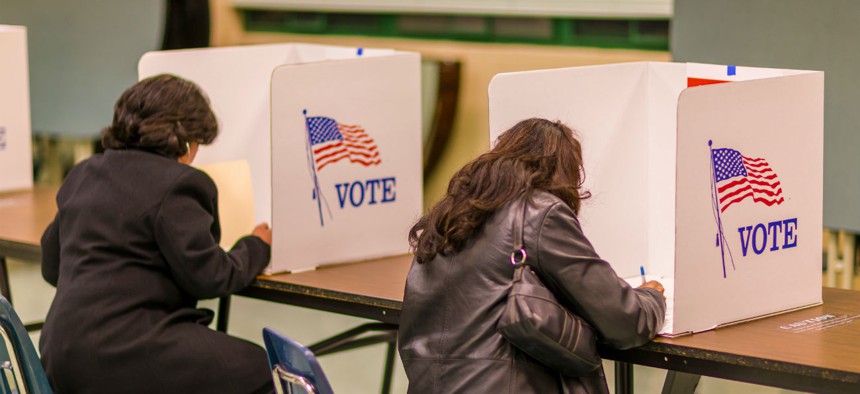
Rob Crandall / Shutterstock.com
Election Commission Needs More Authority In Face of 2020 Threats, Report Finds
“The federal government regulates colored pencils . . . more strictly than it does America’s election infrastructure,” the nonpartisan Brennan Center notes.
With less than a year until the 2020 presidential election, a new report calls on Congress to bolster the authority of the agency that serves as the nation’s elections clearinghouse and devote more funding and resources to it.
The Brennan Center for Justice, a nonpartisan law and public policy institute, released a report on Tuesday that proposes a new framework for protecting election systems. Its recommendations focus on the oversight and internal operations of the Election Assistance Commission, the understaffed and underfunded federal agency responsible for promoting election administration best practices and voting machine security standards.
“The federal government regulates colored pencils, which are subject to mandatory standards promulgated by the Consumer Product Safety Commission, more strictly than it does America’s election infrastructure,” said the report. Although the Homeland Security Department designated election systems as critical infrastructure in 2017 following revelations of Russian interference in the 2016 presidential election, election systems don’t receive the same type of oversight as other sectors with the critical infrastructure classification.
“While voting systems are subject to some functional requirements under a voluntary federal testing and certification regime, the vendors themselves are largely free from federal oversight,” the report said. “Under our proposal, the EAC would extend its existing certification regime from voting systems to include all vendors that manufacture or service key parts of the nation’s election infrastructure.”
The Brennan Center wants Congress to expand the EAC’s authorities to allow it “to certify election vendors more broadly as compliant with voluntary guidelines relating to cybersecurity, personnel, transparency, ownership and control, reporting of cyber incidents and supply chain integrity,” among other things.
Although the EAC doesn’t now have the authority to do a lot of what the authors would like, they note that the EAC can and should require voting system vendors to provide information on cybersecurity best practices, personnel policies and foreign ownership or control through the current registration process. Also, the EAC could suspend or deny vendors’ registration if they don’t comply with criteria the commission sets.
The EAC is currently updating its Voluntary Voting System Guidelines. “It’s a big step forward,” said Lawrence Norden, director of the Election Reform Program at the Brennan Center and one of the report’s authors. “I like the idea that they're looking at the principles first that voting systems need to comply with and leaving room open for innovation,” he said. However, “it’s frustrating that it’s taken so long,” Norden said. “I do think that this is unfortunately one of the issues with having such an underfunded agency that’s had a lot of problems in recent years.”
The EAC is the logical entity to be in charge of the framework proposed by the Brennan Center because it’s independent and bipartisan, despite the fact it’s “been plagued by controversy for years,” the report noted. In order for the EAC to take on such responsibilities, the report said Congress needs to increase its budget, modify the Technical Guidelines Development Committee to include more cybersecurity experts, maintain a full slate of commissioners and staff and subject the agency to more oversight.
Staffing at the EAC has severely decreased over the years and it has struggled to maintain a quorum of three commissioners. The EAC recently lost its executive director and general counsel after the commissioners voted not to reappoint them. “It’s unfortunate going into probably the most critical election we ever had when it comes to issues of election security and resiliency that we don’t have a fully staffed agency right now,” said Norden. “I think the agency has been hollowed by a lack of funding, a lack of interest on the part of Congress and oversight, and making sure that the agency feels both supported and watched.”
“Any agency placed in that [election oversight] role must be structured so as to remain independent of partisan control,” said the report. “It will need experienced, effective staff and leadership who are committed to election security, cybersecurity, technical competency and good and effective election administration.”
On Friday, EAC announced its inspector general will conduct an audit of the $380 million in grant funding Congress appropriated in 2018 through the Help America Vote Act, its first appropriation since 2010. The IG chose Arkansas, Florida, Kentucky, Massachusetts, New Mexico, and West Virginia for review “based on an audit risk analysis that considered neutral factors, applied to all 55 of the grant recipients.”
Although election officials and experts welcomed the money, many said more resources are needed for the commission’s internal operations. “We have no lack of ambition to take on these challenges and help, but we need the resources to do it,” said EAC Vice Chair Ben Hovland, during a House Judiciary Committee hearing on Oct 22. “EAC’s operating budget of $7.95 million is less than the amount Kansas City spends on potholes.”
On this past Election Day, the intelligence and defense agencies released a joint statement affirming their “commitment to quickly share timely and actionable information, provide support and services, and to defend against any threats to our democracy.” They said Russia, Iran, China and others could be working to disrupt our voting process. This is one of the many recent warnings from past and present officials on the ongoing election threats.
"The Russians were who attacked us in 2016, and they're now writing the script for others to do the same. And if we don't get our act together, they will continue to make fools of us internationally," said Fiona Hill, former top Russia expert on the National Security Council, in the newly released transcript of her deposition in the impeachment inquiry. "I just want to, if I've done anything, leave a message to you that we should all be greatly concerned about what the Russians intend to do in 2020.”







